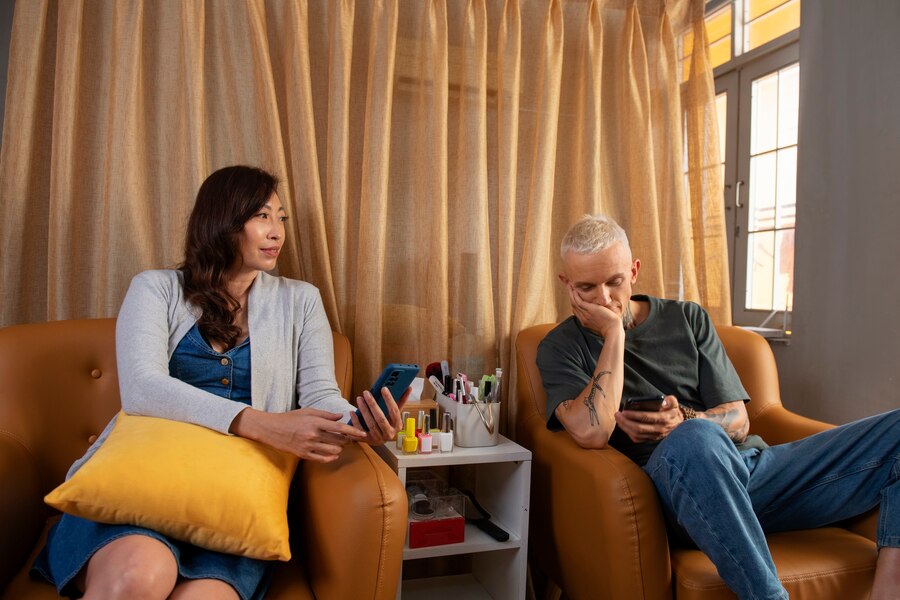Addiction is a formidable adversary that not only affects the individual but also takes a significant toll on relationships. When both partners in a relationship struggle with substance abuse, the challenges can become even more complex and overwhelming. The path to recovery may appear daunting, but the journey becomes considerably more navigable with the right kind of support. This is where couples rehab comes into play.
Couples Rehab in Orange County offers a unique and effective solution for partners battling addiction together. Unlike traditional rehabilitation programs that focus solely on the individual, couples rehab aims to heal both partners simultaneously. This dual approach not only addresses the addiction but also strengthens the relationship, fostering a supportive environment that is conducive to long-term recovery.
In this article, we will delve into the intricacies of couples rehab, exploring its definition, purpose, and the myriad benefits it offers. We will also examine the emotional and psychological support mechanisms that are fundamental to the success of joint treatment, as well as the practical aspects such as choosing the right facility, financial considerations, and aftercare. By the end of this comprehensive guide, you’ll understand that you don’t have to face the challenges of addiction alone; with couples rehab, you and your partner can find the strength and support needed to reclaim your lives together.
Couples Rehab Services
Understanding Couples Rehab
Couples rehab is a specialized form of rehabilitation designed to address substance abuse and addiction within the context of a relationship. It recognizes that when one or both partners struggle with addiction, the dynamics of their relationship can be significantly impacted, often exacerbating the challenges each individual faces. Therefore, a tailored approach that involves both partners can be instrumental in achieving lasting recovery.
Definition and Purpose
Couples rehab is an integrated treatment program where both partners participate in the recovery process together. The primary purpose is to provide a supportive environment where couples can work on their individual and collective issues simultaneously. This approach aims to break the cycle of addiction by addressing not just the substance abuse but also the emotional and relational aspects that contribute to it. By engaging in joint therapy sessions, educational workshops, and support groups, couples learn to understand the root causes of their addiction and develop healthier ways of relating to each other.
Benefits of Joint Treatment
- Shared Experience: One of the most significant benefits of joint treatment is the shared experience of recovery. Partners can provide emotional support and encouragement to each other, which can be incredibly motivating. They understand each other’s struggles and can celebrate each other’s successes, fostering a deeper connection.
- Improved Communication: Couples rehab often includes communication skills training. This helps partners learn to express their feelings and needs more effectively, reducing misunderstandings and conflicts. Improved communication is a cornerstone of a healthy relationship and essential for long-term recovery.
- Accountability: Having a partner in rehab can increase accountability. Knowing that someone else is depending on you can be a powerful incentive to stay on track. Couples can set mutual goals and work towards them together, creating a sense of shared responsibility.
- Understanding Triggers: Couples rehab provides a unique opportunity to identify and understand each other’s triggers. By doing so, partners can develop strategies to avoid or manage these triggers, reducing the risk of relapse.
Common Programs and Therapies
- Detoxification: Detox is often the first step in rehab, where individuals safely withdraw from the substance they are addicted to. In couples rehab, both partners can go through this process simultaneously, supporting each other through the physical and emotional challenges of detox.
- Individual Therapy: While joint treatment is crucial, individual therapy is also a fundamental component of couples rehab. Each partner works with a therapist to address personal issues, traumas, and underlying mental health conditions that contribute to their addiction.
- Couples Therapy: Couples therapy sessions focus on the relationship dynamics that may be contributing to the addiction. Therapists help couples develop healthier patterns of interaction, improve communication, and rebuild trust.
- Family Therapy: Addiction often affects more than just the couple; it impacts families as well. Family therapy sessions can help repair strained relationships and build a supportive network for the couple’s recovery journey.
- Group Therapy: Participating in group therapy with other couples facing similar challenges can be incredibly beneficial. It provides a sense of community and allows couples to share experiences, gain insights, and learn from others.
Understanding couples rehab is the first step towards recognizing its potential to transform relationships and facilitate lasting recovery. By addressing both individual and relational aspects of addiction, couples rehab offers a comprehensive and supportive approach to overcoming substance abuse.
Emotional and Psychological Support
Embarking on the journey to recovery is a challenging yet transformative experience, and doing so with a partner can provide an additional layer of emotional and psychological support. Couples rehab offers a unique environment where both individuals can lean on each other while simultaneously addressing their individual and shared challenges. This section explores how couples rehab fosters emotional and psychological support through building mutual trust, managing relapse together, and strengthening relationship bonds.
Building Mutual Trust
One of the cornerstones of any successful relationship is trust, which can be severely undermined by substance abuse. Couples rehab provides a structured setting where both partners can work on rebuilding this essential component. Through joint therapy sessions, couples have the opportunity to openly communicate about their struggles, fears, and hopes. These sessions are often guided by skilled therapists who help navigate the complexities of trust issues, teaching couples effective communication strategies and conflict resolution skills.
By sharing vulnerabilities in a safe and controlled environment, couples can begin to rebuild the foundation of trust that their relationship is built upon. This mutual understanding and openness not only aid in the recovery process but also pave the way for a healthier, more resilient relationship moving forward.
Managing Relapse Together
Relapse is a common part of the recovery journey, and its impact can be profoundly destabilizing for both individuals and their relationships. Couples rehab equips partners with the tools and strategies needed to manage relapse effectively. By participating in joint counseling sessions, couples learn to recognize the early signs of relapse and develop preemptive action plans to address them.
Moreover, being in a rehab setting together allows partners to serve as accountability partners for one another. This mutual responsibility can be a powerful motivator, as each person is not only working towards their own sobriety but also supporting their partner’s journey. The shared experience of overcoming setbacks can further solidify the bond between partners, proving that they can face and conquer challenges together.
Strengthening Relationship Bonds
Beyond the immediate goal of overcoming substance abuse, couples rehab aims to strengthen the overall relationship between partners. The process involves various therapeutic activities designed to enhance emotional intimacy and connectivity. Activities such as joint therapy sessions, workshops on relationship skills, and group activities foster a deeper understanding and appreciation of one another.
These programs often emphasize the importance of empathy, teaching couples to understand and validate each other’s feelings and experiences. As partners learn to see the world from each other’s perspectives, they can develop a stronger emotional connection. This renewed sense of partnership not only aids in recovery but also enriches the relationship, making it more robust and fulfilling.

Practical Aspects of Couples Rehab
Navigating the path to recovery as a couple involves various practical considerations that can significantly impact the success of the rehabilitation process. Understanding these aspects can help couples make informed decisions, ensuring they receive the most effective and supportive care possible.
Choosing the Right Facility
Selecting the appropriate rehabilitation facility is a critical step. Not all rehab centers offer specialized programs for couples, so it’s essential to find one that accommodates the unique needs of partners undergoing treatment together. Look for facilities that provide comprehensive evaluations to tailor treatment plans to both individuals and the couple as a unit. Key factors to consider include:
- Accreditation and Licensing: Ensure the facility is accredited by recognized health organizations and meets state licensing requirements. This ensures adherence to high standards of care.
- Qualified Staff: The presence of experienced, licensed therapists and medical professionals who specialize in addiction treatment and couples therapy is crucial.
- Tailored Programs: Programs should be flexible and customizable to address both individual and joint needs, including therapy sessions that focus on relationship dynamics and communication.
Financial Considerations
The financial aspect of couples rehab can be a significant concern. Treatment costs can vary widely depending on the facility, the length of stay, and the types of services offered. It’s important to explore all possible avenues for funding and financial assistance:
- Insurance Coverage: Check with your insurance provider to understand what portions of rehabilitation and therapy are covered. Some insurance plans may cover substantial parts of the treatment costs.
- Payment Plans: Many facilities offer payment plans to spread out the costs over time, making it more manageable for couples.
- Grants and Scholarships: Some non-profit organizations and rehab centers offer grants or scholarships to help cover the costs for those who qualify.
- Employer Assistance Programs (EAPs): Some workplaces offer EAPs that can provide financial support or referrals to affordable rehab services.
Aftercare and Continued Support
Recovery doesn’t end with the completion of a rehab program; aftercare and continued support play vital roles in maintaining sobriety. Effective aftercare plans should include:
- Ongoing Therapy: Continued individual and couples therapy sessions can help address any ongoing issues and strengthen the relationship. This may include regular meetings with a therapist or participation in support groups.
- Support Networks: Engage with support groups for couples, such as Alcoholics Anonymous (AA) or Narcotics Anonymous (NA), which can provide a community of individuals who understand your journey.
- Relapse Prevention Plans: Develop a comprehensive relapse prevention plan that includes coping strategies, triggers identification, and emergency contacts.
- Lifestyle Changes: Incorporate healthy lifestyle changes that support sobriety, such as maintaining a balanced diet, exercising regularly, and fostering hobbies and interests that do not involve substance use.
By carefully considering these practical aspects, couples can set a strong foundation for their journey towards recovery, harnessing the power of mutual support to overcome challenges and build a healthier, more resilient relationship.
Find Support at Couples Rehab
In our journey through the intricacies of couples rehab, we’ve uncovered a profound truth: you don’t have to face the challenge of addiction alone. Couples rehab offers a unique and transformative approach to recovery, emphasizing the power of mutual support and shared healing. By understanding what couples rehab entails, recognizing its benefits, and exploring the various therapies available, couples can make informed decisions about their treatment path.
The emotional and psychological support gained through couples rehab is invaluable. By building mutual trust, managing relapse together, and strengthening relationship bonds, couples can emerge from the process not just as individuals in recovery but as a united front ready to face life’s challenges together. The journey to sobriety is undoubtedly arduous, but when undertaken with a partner, it becomes a shared mission characterized by empathy, understanding, and unwavering support.
Practical considerations, such as choosing the right facility, addressing financial concerns, and planning for aftercare, play a crucial role in the success of couples rehab. Selecting a facility that aligns with your needs and values can set the foundation for a successful recovery journey. Understanding the financial aspects ensures that the focus remains on healing rather than financial strain, while comprehensive aftercare plans provide ongoing support to maintain sobriety and nurture the relationship.
In conclusion, couples rehab is not merely about overcoming addiction; it’s about rediscovering the strength of your relationship and building a future grounded in mutual respect, trust, and love. The road to recovery may be long and fraught with challenges, but with the right support system—both professional and personal—couples can navigate this path hand-in-hand, emerging stronger and more resilient than ever. Remember, you don’t have to do this alone. The support of couples rehab can be the guiding light that leads you through the darkness of addiction into the dawn of a healthier, happier life together.

FAQs
FAQ 1: What is the importance of seeking support from Couples Rehab?
Answer: Seeking support from Couples Rehab is crucial as it provides a nurturing environment where both partners can navigate the challenges of recovery together, fostering mutual understanding, accountability, and shared commitment to healing.
FAQ 2: How does Couples Rehab provide support for couples in recovery?
Answer: Couples Rehab offers tailored support through couples counseling, individualized treatment plans, and group therapy, creating a supportive framework that acknowledges the unique dynamics and challenges faced by couples in recovery.
FAQ 3: What are the benefits of choosing Couples Rehab for support in overcoming substance abuse and addiction?
Answer: Choosing Couples Rehab for support offers the benefit of addressing substance abuse and addiction within the context of the relationship, allowing partners to heal together, rebuild trust, and develop healthy coping strategies as a unified team.
FAQ 4: Can individuals in relationships with different substance abuse issues benefit from the support of Couples Rehab?
Answer: Yes, Couples Rehab provides support for individuals in relationships facing different substance abuse issues, offering personalized treatment that addresses each partner’s unique needs while promoting joint growth and recovery.
FAQ 5: How does the support of Couples Rehab empower individuals and their partners in recovery?
Answer: The support of Couples Rehab empowers individuals and their partners by fostering open communication, strengthening the relationship, and providing a foundation for shared growth, creating a supportive environment that promotes lasting positive change.
FAQ 6: Is the support of Couples Rehab available in both residential and outpatient settings?
Answer: Yes, the support of Couples Rehab is available in both residential and outpatient settings, offering couples the flexibility to choose the level of care that best suits their circumstances while receiving comprehensive support tailored to their needs.
FAQ 7: What role does individual therapy play in the support provided by Couples Rehab?
Answer: Individual therapy within Couples Rehab supports each partner in addressing personal challenges, trauma, and underlying issues, fostering personal growth and creating a foundation for healthy, supportive relationships.
FAQ 8: How can couples access the support of Couples Rehab?
Answer: Couples can access the support of Couples Rehab by reaching out to our admissions team, who will provide guidance, conduct assessments, and assist in creating personalized treatment plans tailored to their specific needs and goals.
FAQ 9: What sets the support of Couples Rehab apart as a leading resource for couples in recovery?
Answer: The support of Couples Rehab stands out as a leading resource due to its focus on couples’ unique dynamics, evidence-based therapeutic approaches, experienced professional staff, and a nurturing environment that promotes shared healing and growth.
FAQ 10: What should individuals consider when seeking the support of Couples Rehab?
Answer: Individuals seeking the support of Couples Rehab should consider the importance of mutual commitment to recovery, open communication, and a willingness to engage in the therapeutic process as a couple to promote lasting positive change.


















